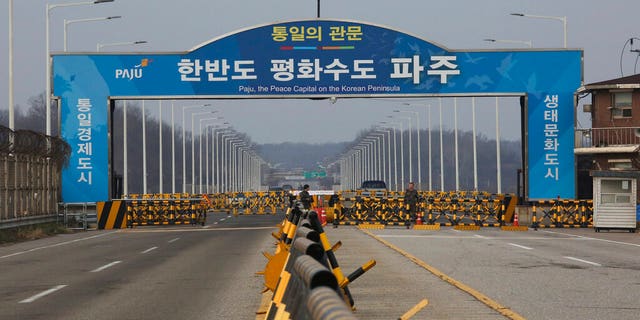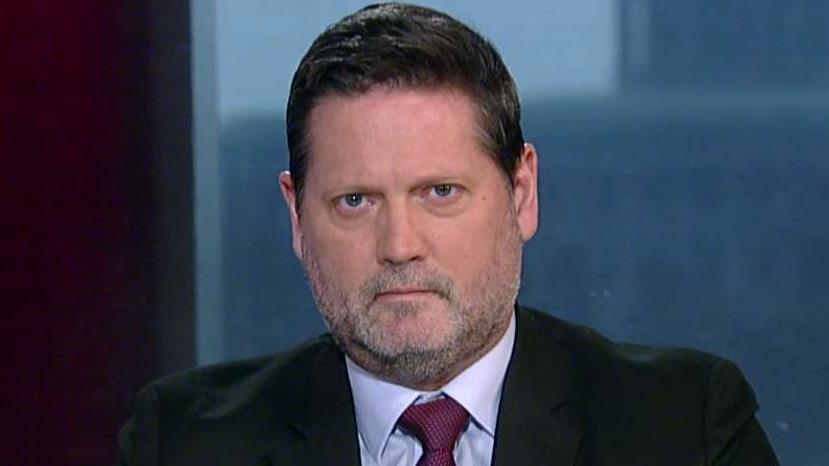U.S. officials are on high alert for signs of a possible missile launch from North Korea in the coming days that officials have referred to as a “Christmas gift.”
A significant launch or nuclear test would raise the end of North Korea's self-imposed moratorium on missile launches and tests. It would also be a major blow to one of President Trump’s major foreign policy goals to get North Korea back to the negotiating table to eliminate its nuclear weapons.

In this Dec. 16, 2019, photo, South Korean army soldiers stand guard at the Unification Bridge, which leads to the Panmunjom in the Demilitarized Zone in Paju, South Korea. (AP)
Earlier this month, the North conducted what U.S. officials say was an engine test. Experts believe it may have involved an engine for a long-range missile.
"North Korea has been advancing. It has been building new capabilities," said Anthony Wier, a former State Department official who tracks nuclear disarmament for the Friends Committee on National Legislation. "As long as that continues, they gain new capabilities to try new missiles to threaten us and our allies in new ways,"
North Korea warned of a possible "Christmas gift" in early December, saying the Trump administration was running out of time on nuclear negotiations, and it was up to the U.S. to choose what "Christmas gift" it gets from Pyongyang.
Victor Cha, a Korea expert at the Center for Strategic and International Studies, said a review of the possible launch sites in North Korea shows they are a "basically ready to go."
Defense Secretary Mark Esper told reporters earlier this week that the U.S. has heard all the talk of a possible upcoming test around Christmas.
"I've been watching the Korean Peninsula for a quarter-century now. I'm familiar with their tactics, with their bluster," he said. "We need to get serious and sit down and have discussions about a political agreement that denuclearizes the peninsula. That is the best way forward and arguably the only way forward if we're going to do something constructive."
Army Gen. Mark Milley, the chairman of the U.S. Joint Chiefs of Staff, told reporters Friday that the U.S., Japan, and South Korea are ready to defend against any move by the North.
"We always maintain very high levels of readiness," he said.
At a meeting in Singapore in June 2018, Trump and North Korean leader Kim Jong Un issued a joint statement that the North "commits to work toward complete denuclearization of the Korean Peninsula." But negotiations stalled in February after the U.S. rejected North Korea’s demands for broad sanctions relief in exchange for a partial surrender of the North's nuclear capabilities.
According to the U.S. military, North Korea has launched more than 20 missiles this year. They've included new types of missiles as well as a submarine-launched ballistic missile, in violation of U.N. Security Council resolutions.
In 2017, North Korea conducted a torrent of missile tests, including flying two intermediate-range missiles over Japan and threatening to fire those weapons toward the U.S. territory of Guam. It also tested three developmental ICBMs, including the Hwasong-15 that demonstrated the potential range to reach deep into the U.S. mainland.
But those ICBM tests showed no clear sign the North had perfected the technology needed to ensure a warhead could survive atmospheric re-entry. Experts said North Korea needed additional flight tests to determine the reliability and accuracy of its ICBMs and establish a capable re-entry protection system.
North Korea’s missile tests in 2017 triggered a sharp U.S. reaction. Trump said he would bring "fire and fury" to North Korea and exchanged threats of total destruction with its leader. Kim subsequently suspended ICBM and nuclear tests, allowing Trump to tout the move as a foreign policy win.
Esper, who has visited Korea twice this year since being sworn in as defense chief, said the U.S. now has a team on the Korean peninsula that has asked the North for meetings. At the same time, he said the U.S. military remains at a high level of readiness.
A key discussion point has been the reduction in U.S. military exercises with South Korea — a move by the Trump administration to appease North Korea and woo them to the negotiating table for denuclearization talks. The U.S. has about 28,000 troops in South Korea.


No comments:
Post a Comment